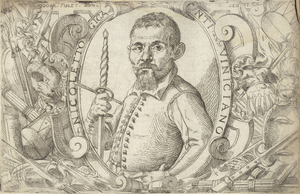|
|
You are not currently logged in. Are you accessing the unsecure (http) portal? Click here to switch to the secure portal. |
Wiktenauer:Main page/Featured
| Nicoletto Giganti | |
|---|---|
 | |
| Born | 1550s-60s Fossombrone, Italy |
| Died | date of death unknown |
| Occupation |
|
| Citizenship | Republic of Venice |
| Patron |
|
| Influenced | Bondì di Mazo (?) |
| Genres | Fencing manual |
| Language | Italian |
| Notable work(s) |
|
| First printed english edition |
Leoni, 2010 |
| Concordance by | Michael Chidester |
Nicoletto Giganti (Niccoletto, Nicolat) was an Italian soldier and fencing master around the turn of the 17th century. He was likely born to a noble family in Fossombrone in central Italy, and only later became a citizen of Venice. Little is known of Giganti’s life, but in the dedication to his 1606 treatise he claims 27 years of professional experience, meaning that his career began in 1579 (possibly referring to service in the Venetian military, a long tradition of the Giganti family). Additionally, the preface to his 1608 treatise describes him as a Master of Arms to the Order of Santo Stefano in Pisa, a powerful military order founded by Cosimo I de' Medici, giving some further clues to his career.
In 1606, Giganti published a treatise on the use of the rapier (both single and with the dagger) titled Scola, overo teatro ("School or Theater"). It is dedicated to Cosimo II de' Medici. This treatise is structured as a series of progressively more complex lessons, and Tom Leoni opines that this treatise is the best pedagogical work on rapier fencing of the early 17th century. It is also the first treatise to fully articulate the principle of the lunge.
In 1608, Giganti made good on the promise in his first book that he would publish a second volume. Titled Libro secondo di Niccoletto Giganti ("Second Book of Niccoletto Giganti"), it is dedicated to Christofano Chigi, a Knight of Malta, and covers the same weapons as the first as well as rapier and buckler, rapier and cloak, rapier and shield, single dagger, and mixed weapon encounters. This text in turn promises additional writings on the dagger and on cutting with the rapier, but there is no record of further books by Giganti ever being published.
While Giganti's second book quickly disappeared from history, his first seems to have been quite popular: reprints, mostly unauthorized, sprang up many times over the subsequent decades, both in the original Italian and, beginning in 1619, in French and German translations. This unauthorized dual-language edition also included book 2 of Salvator Fabris' 1606 treatise Lo Schermo, overo Scienza d’Arme which, coupled with the loss of Giganti's true second book, is probably what has lead many later bibliographers to accuse Giganti himself of plagiarism.
(Read more…)
- Recently Featured:
- Hans Talhoffer – Andre Lignitzer – Adam van Breen – Francesco Fernando Alfieri
